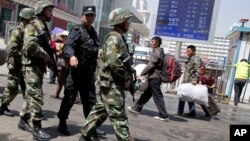Afghanistan’s historic political transition appears to have encouraged China to intensify its diplomatic efforts toward helping the war-shattered country sustain its political, security and economic gains after NATO’s combat mission ends in December.
China has recently witnessed some of the deadliest violence in its restive Xinjiang autonomous region near Afghanistan and Pakistan.
Beijing suspects Muslim Uighur separatists in Xinjing have links to Islamist militants entrenched in volatile areas of the two neighboring countries.
China’s increased regional involvement, observers say, stems from its concerns that persisting instability in Afghanistan and presence of anti-China militants in Pakistani border areas after NATO’s withdrawal could fuel the Xinjiang troubles.
Diplomats, scholars and politicians from the three neighboring nations gathered in Islamabad this week to discuss how to strengthen Afghan political, security and economic gains. Chinese Ambassador Sun Weidong promised his country’s continued support for Afghanistan.
“China will continue to develop all-round good neighborly relations with Afghanistan and maintain close cooperation with the new government," he said. "China is ready to work with the international community to support Afghanistan to complete its transitions smoothly and help Afghanistan achieve lasting peace and sustainable development at an early date.”
The Chinese ambassador also appreciated efforts Pakistan is making to promote dialogue, cooperation and improve relations with Afghanistan.
“As I see it, the trilateral cooperation among China, Afghanistan and Pakistan is facing new opportunities... . Terrorism, religious extremism and separatism are the common threats to us," said Weidong. "We should crack down on those threats with more close coordination. China is ready to strengthen our cooperation with Pakistan and Afghanistan in personnel training and technical exchanges on counterterrorism, anti-narcotics for our common interests of national security.”
The Afghan ambassador to Pakistan, Janan Mosazai, said increased Chinese investment is helping economic activity in his country. Mosazai reiterated that the new government is determined to launch a substantive and meaningful peace process with the Afghan armed opposition, including the Taliban.
“As we pursue this goal, we will continue to rely on help and support from our friends and partners, including both Pakistan and China,” said Mosazai.
Pakistan’s national security adviser Sartaj Aziz reiterated that Islamabad no longer supports the Afghan Taliban and believes its return to power in Kabul by force would be detrimental to Pakistan’s national interests.
“This is a moment of hope and optimism in Afghanistan because the successful completion of the electoral process and the formation of a national unity government are landmark achievements despite all the difficulties," he said. "And the first-ever peaceful transfer from power from one elected president to another elected president is also a matter of pride not just for Afghanistan but also for us.”
Aziz also underscored importance of China’s deepening engagement with Afghanistan in all areas, saying, “We both recognize that terrorism, extremism and narcotics are serious threats and believe that these should be neutralized through coordinated efforts
"Conscience of the lessons of history," he added, "Pakistan has been consistently stressing that there should be no repeat of [the Afghan civil war of] 1990s. In our view, every effort should be made to ensure that neither there is any attempt from outside to fill any perceived security vacuum in Afghanistan nor is there an economic vacuum should be allowed to emerge.”
Beijing has expanded its economic intervention in Afghanistan over the past decade to become the country's largest investor. But it has avoided deeper involvement in Afghan affairs. Analysts say that as the drawdown of NATO forces approaches, China views the potential for Afghan instability as a threat to its domestic security and economic growth.
China hosts talks on Afghanistan later this month (October 31), when foreign ministers of Afghanistan’s partner nations will discuss ways to further Afghan political, economic and national reconciliation efforts. This will mark Beijing’s most significant regional engagement on Afghanistan to date.




